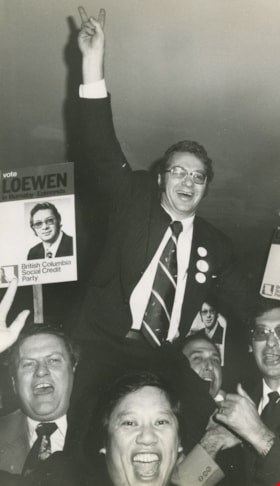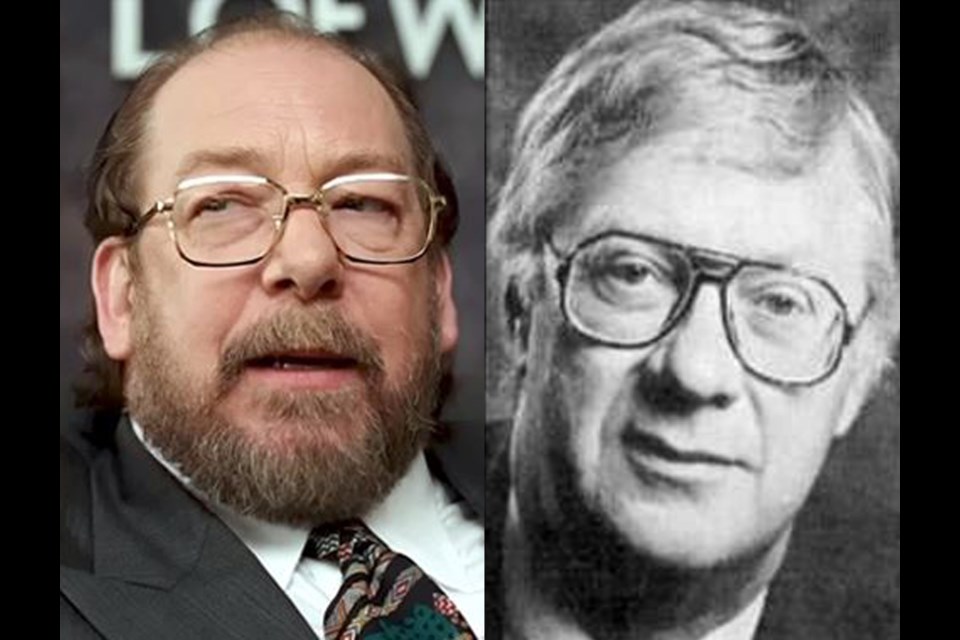An ex-Burnaby MLA who founded a vast Burnaby-headquartered funeral services empire has been cast as the villain of a new movie on Amazon Prime starring Jamie Foxx and Tommy Lee Jones this month.
The Burial tells the tale of rags-to-riches lawyer Willie Gary (Foxx) helping Mississippi funeral home owner Jeremiah O'Keefe (Jones) save his family business from a corporate juggernaut intent on capitalizing on a "golden era of death."
The name of the corporate behemoth is Loewen Group, and its founder and CEO is Ray Loewen, played by Bill Camp.
The movie centres on a lawsuit launched by O'Keefe that ultimately ends in a Mississippi jury slapping Loewen Group with $500 million in damages – five times the amount O'Keefe had originally sought.
It was a blow from which the company and its founder would never fully recover.
Burnaby connection
While the film never mentions Burnaby, Ray Loewen's real-life funeral home empire was headquartered in the city, and the $11-million mansion he built at 7629 Burris St. while Loewen Group was flying high is still Burnaby's second most expensive residential property – second only to Michael Bublé's.
Loewen, who took over his family's funeral home in Steinbach, Man. in the 1960s, moved to Burnaby in 1969 after buying two funeral homes in New Westminster.
But the rise of his death-care empire wasn't a straight line from there.
In 1975, he put his business ventures on hold and ran for provincial office, unseating NDP veteran Gordon Dowding during an election that saw Bill Bennett's Social Credit Party push Dave Barrett's New Democrats out of office.
Known as "Digger" because of his funeral director background, Loewen was the target of occasional undertaker-themed zingers in the legislature.
On one occasion, after Loewen had referred to Barrett as "the late premier," Barrett turned to the chair and said, "Mr. Chairman, coming from him, that's threatening. He's running after me with a tape measure."

Death-care empire
Loewen didn't run for a second term in 1979. He told reporters he wanted to spend more time with family, but Rosemary Brown, the popular NDP candidate set to run against him, said he knew he couldn't win against her.
After his foray into provincial politics, Loewen concentrated on real estate development with Loewen Development Corp., building half-a-dozen highrise apartments in Burnaby, among other projects, before the 1981 recession brought an end to that chapter.
Already the owner of more than a dozen funeral homes, Loewen said he started getting more calls about funeral homes for sale in about 1983, according to a 1992 BC Business story.
After some financial restructuring in the mid-1980s, Loewen Group went on a buying spree that would last more than a decade.
But the Burnaby firm wasn't alone.
Loewen Group, along with Texas-based Service Corporation International and New Orleans-based Stewart Enterprises Inc. were all hoovering up mom-and-pop funeral homes, sprucing them up, and using economies of scale to create vast profits and push out the competition.
Loewen Group was soon the biggest death-care provider in Canada and the second largest in North America behind SCI.
By September 1995, the company had corporate offices in Philadelphia and Cincinnati and had acquired 764 funeral homes and 172 cemeteries, 8,000 employees and more than $1 billion in assets, according to a Province story at the time.
Entrepreneur of the year
During the first half of the 1990s, Ray Loewen was the darling of the B.C. business pages and his company a star on the Toronto Stock Exchange.
Loewen, whose personal wealth was estimated at $426.5 million in 1995, according to Canadian Business magazine, was named entrepreneur of the year by BC Business in 1991, and business writers raved regularly about Loewen Group’s "lively bottom line" and "profitable undertaking."
Loewen's ballooning salary, his bonuses and perks – a yacht, private jet and helicopter – routinely made the front page of B.C. business sections.
Headlines spoke of Loewen being "buried with praise" at annual shareholder meetings.
And no wonder.
From 1991 through 1995, Loewen Group more than tripled its revenue to just shy of $600 million, according to a Time Magazine article.
Shares were trading at an all-time high of before the company's May 1995 AGM, and one Vancouver Sun reporter said Ray Loewen "basically took one long bow" as he told investors they could see earnings jump 30 per cent in the coming year.
"The exponential growth we see as a result of increased acquisitions is dramatic," Loewen told shareholders, according to the Sun story. "So everything that we see looks very, very positive for the next three to five years."
Even as he spoke, though, a harbinger of doom lurked in the company's 1994 annual report.
In a footnote, the company said Loewen Group was party to "certain legal proceedings" but didn't regard the outcome of any of them as "material."
Enter the Mississippi lawsuit.
Downward spiral
When news broke of the jury's $500 million award on Nov. 1, Loewen shares plunged and the company's total stock market value dropped by $522 million in three days.
Loewen Group would have appealed the jury's decision, which Loewen described as "an outrageous example of the jury system gone amok in American," but couldn't raise a $625 million U.S. bond required by Mississippi law to proceed.
In the end, the case was settled for $175 million.
The downfall of Loewen Group and its CEO and chairman didn't follow a straight line down either.
The company continued its aggressive strategy of buying up funeral businesses; it recorded profits, and its stock rebounded somewhat, but never to its September 1995 peak of $56.50 per share.
Five years later, the company suffocating in debt, those shares were trading at 58 cents on the TSE.
By that time, Ray Loewen had stepped down as the company's CEO and chairman, and his director position on the board had been eliminated.
One analyst opined Loewen had gambled his company could bounce back from the crippling Mississippi lawsuit with a "no-holds-barred, rapid growth strategy."
"The strategy turned out to be awfully, awfully wrong," the analyst said to the Sun.
'Manifest injustice'
Loewen's last kick at the Mississippi jury's ruling was a Hail Mary, $1-billion complaint against the United States government under the North American Free Trade Agreement, which includes provisions to protect foreign investors.
The NAFTA panel that ruled on the case in 2003 agreed with Loewen that the jury's verdict had been a "manifest injustice" under international law but didn’t offer Loewen or his company any financial compensation.
Ray Loewen, once a regular presence on the pages of local and provincial newspapers, virtually disappeared from public view after the empire he created filed for bankruptcy protection in 1999.
The company emerged under new ownership as Alderwoods Group in January 2002 but was finally bought out by Loewen's archrival, SCI, four years later.
His last media interview with a B.C. newspaper appears to date back to 2008, when the Loewens put their Twin Cedars mansion in Burnaby up for sale.
The Vancouver Sun story described the mansion as the family's refuge during some tumultuous business times.
"We have had a very public life," Loewen told the Sun, "and our home has been a place of privacy and security for us."
The property, which was listed at $25 million, sold for just under $10 million in 2012.
Fun facts:
In 1994, Loewen Group spent $1,269,000 US leasing "at competitive rates" a luxury yacht, jet and helicopter from a company owned by Ray Loewen.
Loewen’s 36-metre superyacht was called Alula Spirit.
Loewen wore a gold lapel pin of an eagle clutching a diamond in its talons.
Loewen espoused what he called the Eagle Principle: "To soar to the heights of possibilities, one needs two equally healthy, strong wings – one being that of people and service concerns, the other that of responsible planning and fiscal management."
Rev. Henry J. Lyons, the head of the church organization Loewen Group is accused of exploiting, was convicted of grand theft and racketeering in 1999 for stealing millions of dollars from companies, including Loewen Group, who wanted to use the church to sell products to Black churchgoers.
After taking over the family's funeral home in Manitoba, Ray Loewen fired his brothers.
Loewen Group's former Burnaby headquarters is a non-descript red brick building at 4126 Norland Ave.
None of Loewen Group's branding ever appeared on the funeral homes it bought, and local management was often kept in place, giving the impression the businesses were still locally owned.
Twin Cedars, Loewen’s Burnaby mansion, took two years to build and had a racquetball court in the basement as well as a tennis court and pool.
The Loewen family lived in a split level home on Lambeth Drive in Burnaby's Buckingham Heights neighbourhood when Ray Loewen was MLA for Burnaby-Edmonds.
One of the funeral homes Loewen Group bought in 1985 in the Maritimes, J.A. Snow, had embalmed 300 bodies from the Titanic disaster.
Ray Loewen used 250 campaign workers and spent $14,021 during his 1975 campaign to become Burnaby-Edmonds MLA. His opponent, Gordon Dowding used 100 workers and spent $3,950.
Loewen Group donated $250,000 to the Canuck Place Children's Hospice before its opening in 1995 and pledged an annual $70,000 sustaining gift.
Follow Cornelia Naylor on Twitter @CorNaylor
Email [email protected]


